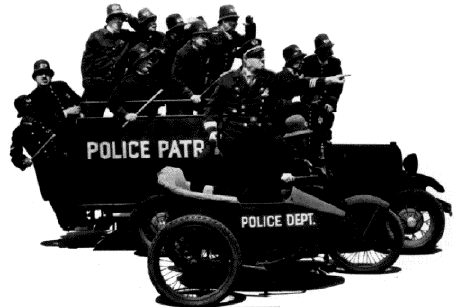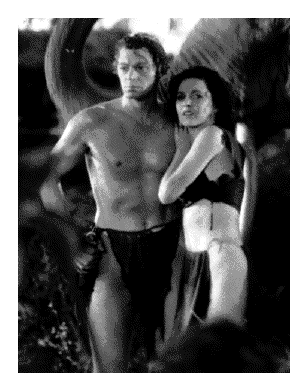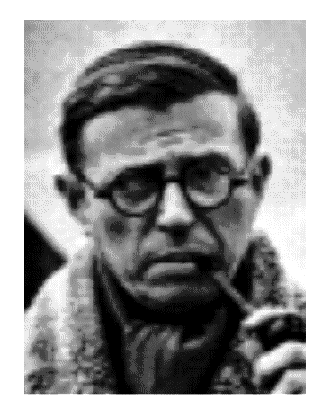Pearls
at the
Hippo-
drome

The show had begun. We would stumblingly follow the usherette. I would feel I was doing something clandestine. Above our heads, a shaft of light crossed the hall; one could see dust and vapor dancing in it. A piano whinnied away. Violet pears shone on the walls. The varnish-like smell of a disinfectant would being a lump to my throat. The smell and the fruit of that living darkness blended within me: I ate the lamps of the emergency exit, I filled up on their acid taste. I would scrape my back against knees and take my place in a creaky seat. My mother world slide a folded blanket under my behind to raise me. Finally, I would look at the screen. I would see a fluorescent chalk and blinking landscapes streaked with showers; it always rained, even when the sun shone brightly, even in apartments. At times, an asteroid in flames would shoot across the drawing room of a baroness without her seeming to be surprised. I liked that rain, that restless anxiety which played on the wall. The pianist would attack the overture to Finegal's Cave and everyone understood that the criminal was about to appear: the baroness would be frightened out of her wits. But her beautiful sooty face would make way for the purple show-card: End of Part I. The lights would go on, it was a sudden awakening. Where was I? In a school? In an official building? Not the slightest ornament: rows of flap-seats beneath which could be seen their springs, walls smeared with ochre, a floor strewn with cigarette stubs and gobs of spit. Confused murmurs filled, the hall, language was reinvented, the usherette would walk up and down selling hard candies. My mother would buy me some, I would put them into my mouth, I would suck the emergency lamps. The people would rub their eyes, everyone discovered his neighbors. Soldiers, maids from the neighborhood; a bony old man would be chewing tobacco; bare-headed working girls would laugh loudly. That world wasn't ours. Fortunately, here and there on that sea of heads were big fluttering hats which were reassuring.
The social hierachy of the theatre had given my grandfather and late father, who were accustomed to second balconies, a taste for ceremonial. When many people are together, they must be separated by rites; otherwise, they slaughter each other. The movies proved the opposite. This mingled audience seemed united by a catastrophe rather than a festivity. Etiquette, now dead, revealed the true bond among men: adhesion. I developed a dislike for ceremonies, I loved crowds. I have seen crowds of all kinds, but the only other time I have witnessed that nakedness, that sense of everyone's direct relationship to everyone else, that waking dream, that dim consciousness of the danger of being a man, was in 1940, in Stalag XII D.
 My mother grew bolder, to the point of taking me to the boulevard houses: the Kinérama, the Folies Dramatiques, the Vaudeville, the Gaumont Palace, which was then called the Hippodrome. I saw Zigomar and Fantómas, The Exploits of Maciste, The Mysteries of New York. The gilding spoiled my pleasure. The Vaudeville, a former legitimate theatre, was unwilling to give up its former grandeur: until the very last minute, the screen was hidden by a red tassled curtain; three raps were given to announce the beginning of the performance; the orchestra would play an overture; the curtain would go up; the lights would go down. I was irritated by that incongruous ceremonial, by that dusty pomp, the only result of which was to move the characters further away. In the balcony, in the gallery, our fathers, impressed by the chandelier and the paintings on the ceiling, neither could nor would believe that the theatre belonged to them: they were received there. As for me, I wanted to see the fiilm as close up as possible. I had learned in the equalitarian discomfort of the neighborhood houses that this new art was mine, just as it was everyone else's. We had the same mental age: I was seven and knew how to read; it was twelve and did not know how to talk. People said that it was in its early stages, that it had progress to make; I thought that we would grow up together. I have not forgotten our common childhood: whenever I am offered a hard candy, whenever a woman varnishes her nails near me, whenever I inhale a certain smell of disinfectant in the toilet of a provincial hotel, whenever I see the violet bulb on the ceiling of a night-train, my eyes, nostrils, and tongue recapture the lights and odors of those bygone halls; four years ago, in rough weather off the coast of Fingal's Cave, I heard a piano in the wind.
My mother grew bolder, to the point of taking me to the boulevard houses: the Kinérama, the Folies Dramatiques, the Vaudeville, the Gaumont Palace, which was then called the Hippodrome. I saw Zigomar and Fantómas, The Exploits of Maciste, The Mysteries of New York. The gilding spoiled my pleasure. The Vaudeville, a former legitimate theatre, was unwilling to give up its former grandeur: until the very last minute, the screen was hidden by a red tassled curtain; three raps were given to announce the beginning of the performance; the orchestra would play an overture; the curtain would go up; the lights would go down. I was irritated by that incongruous ceremonial, by that dusty pomp, the only result of which was to move the characters further away. In the balcony, in the gallery, our fathers, impressed by the chandelier and the paintings on the ceiling, neither could nor would believe that the theatre belonged to them: they were received there. As for me, I wanted to see the fiilm as close up as possible. I had learned in the equalitarian discomfort of the neighborhood houses that this new art was mine, just as it was everyone else's. We had the same mental age: I was seven and knew how to read; it was twelve and did not know how to talk. People said that it was in its early stages, that it had progress to make; I thought that we would grow up together. I have not forgotten our common childhood: whenever I am offered a hard candy, whenever a woman varnishes her nails near me, whenever I inhale a certain smell of disinfectant in the toilet of a provincial hotel, whenever I see the violet bulb on the ceiling of a night-train, my eyes, nostrils, and tongue recapture the lights and odors of those bygone halls; four years ago, in rough weather off the coast of Fingal's Cave, I heard a piano in the wind.
Though impervious to the sacred, I loved magic. The cinema was a suspect appearance that I loved perversely for what it still lacked. That streaming was everything, it was nothing, it was everything reduced to nothing. I was witnessing the delirium of a wall; solids had been freed from a massiveness that weighed on me, that weighed even on my body, and my young idealism was delighted with that infinite contraction. At a later time, the transpositions and rotations of triangles reminded me of the gliding figures on the screen. I loved the cinema even in plane geometry. To me, black and white were the supercolors that contained all the others and revealed them only to the initiate; I was thrilled at seeing the invisible. Above all, I liked the incurable muteness of my heroes. But no, they weren't mute, since they knew how to make themselves understood. We communicated by means of music; it was the sound of their inner life. Persecuted innocence did better than merely show or speak of suffering: it permeated me with its pain by means of the melody that issued from it. I would read the conversations, but I heard the hope and bitterness; I would perceive by ear the proud grief that remains silent. I was compromised; the young widow who wept on the screen was not I, and yet she and I had only one soul: Chopin's funeral march; no more was needed for her tears to wet my eyes. I felt I was a prophet without being able to foresee anything: even before the traitor betrayed, his crime entered me; when all seemed peaceful in the castle, sinister chords exposed the murderer's presence. How happy were those cowboys, those musketeers, those detectives: their future was there, in that premonitory music, and governed the present. An unbroken song blended with their lives, led them on to victory or death by moving toward its own end. They were expected: by the girl in danger, by the general, by the traitor lurking in the forest, by the friend who was tied up near a powder-keg and who sadly watched the flame run along the fuse. The course of that flame, the virgin's desperate struggle against her abductor, the hero's gallop across the plain, the interlacing of all those images, of all those speeds, and, beneath it all, the demonic movement of the "Race to the Abyss," an orchestral selection taken from The Damnation of Faust and adapted for the piano, all of this was one and the same: it was Destiny.
 The hero dismounted, put out the fuse, the traitor sprang at him, a duel with knives began: but the accidents of the duel likewise partook of the rigor of the musical development; they were fake accidents which ill concealed the universal order. What joy when the last knife stroke coincided with the last chord! I was utterly content, I had found the world in which I wanted to live, I touched the absolute. What an uneasy feeling when the lights went on: I had been wracked with love for the characters and they had disappeared, carrying their world with them. I had felt their victory in my bones; yet it was theirs and not mine. In the street I found myself superfluous.
The hero dismounted, put out the fuse, the traitor sprang at him, a duel with knives began: but the accidents of the duel likewise partook of the rigor of the musical development; they were fake accidents which ill concealed the universal order. What joy when the last knife stroke coincided with the last chord! I was utterly content, I had found the world in which I wanted to live, I touched the absolute. What an uneasy feeling when the lights went on: I had been wracked with love for the characters and they had disappeared, carrying their world with them. I had felt their victory in my bones; yet it was theirs and not mine. In the street I found myself superfluous.